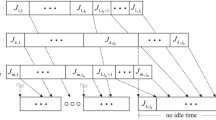Abstract
This paper presents a multi-objective flexible flow shop scheduling problem with limited time lag between stages. n jobs are available to schedule in a predetermined due window. A mixed integer linear programming model with the objectives of maximizing the total profit gained from scheduled jobs and minimizing deviation from the due date is introduced. Due to non-deterministic polynomial-time-hard complexity, the problem is solved with an efficient genetic algorithm. A heuristic mechanism is devised in every generation of the genetic algorithm to assure the solution feasibility. This heuristic also decreases the total solution time by reducing the search space. Computational results show that the presented approach finds solutions of good quality in reasonable runtimes.
Similar content being viewed by others
References
Sriskandarajah C (1993) Performance of scheduling algorithms for no-wait flow shop with parallel machines. Eur J Oper Res 70:365–378
Hall NG, Sriskandarajah C (1996) A survey of machine scheduling problems with blocking and no-wait in process. Oper Res 44:510–525
Aldowaisan T, Allahverdi A (2004) New heuristics for m-machine no-wait flowshop to minimize total completion time. Omega 32:345–352
Candar O (1999) Machine scheduling problems with blocking & no-wait in process. Department of industrial engineering. Bilkunt University. (Unpublished paper)
Thonton HW, Hunsucker JL (2004) A new heuristic for minimal makespan in flow shops with multiple processors and no intermediate storage. Eur J Oper Res 152:96–114
Bertolissi E (2000) Heuristic algorithm for scheduling in the no-wait flow shop. J Mater Process Technol 107:459–465
Liu Sh, Tang J, Song J (2006) Order-planning model and algorithm for manufacturing steel sheets. Int J Prod Econ 100:30–43
Riezebos J, Gaalman GJC (1998) Time lag size in multiple operations flow shop scheduling heuristics. Eur J Oper Res 105:72–90
Botta-Genoulaz V (2000) Hybrid flow shop scheduling with precedence constraints and time lags to minimize maximum lateness. Int J Prod Econ 64:101–111
Ruiza R, Rodríguez JAV (2010) The hybrid flow shop scheduling problem. Eur J Oper Res 205(1):1–18
Grabowski J, Pempera J (2000) Sequencing of jobs in some production system. Eur J Oper Res 125:535–550
Soukhal A, Oulamara A, Martineau P (2005) Complexity of flow shops scheduling problems with transportation constraints. Eur J Oper Res 161:32–41
Sidney JB, Potts CN, Sriskandarajah C (2000) A heuristic for scheduling two-machine no-wait flow shops with anticipatory setups. Oper Res Lett 26:535–550
Fondrevelle J, Oulamara A, Portmann M-C (2006) Permutation flowshop scheduling problems with maximal and minimal time lags. Comput Oper Res 33:1540–1556
Yeung WK, Oguz C, Cheng TCE (2004) Two-stage flowshop earliness and tardiness machine scheduling involving a common due date. Int J Prod Econ 90-3:421–434
Valente JMS, Alves RAFS (2005) An exact approach to early/tardy scheduling with release dates. Comput Oper Res 32:2905–2917
Gabrel V (1995) Scheduling jobs within time windows on identical parallel machines: new model and algorithms. Eur J Oper Res 83:320–329
Garcia JM (2002) Genetic algorithm for solving a production and delivery scheduling problem with time windows. In: Garijo FJ et al (eds) Advances in artificial intelligence. IBERAMIA, Springer, Berlin, pp 371–380
Garcia JM, Lozano S (2005) Production and delivery scheduling problem with time windows. Comput Ind Eng 48:733–742
Jolai F, Sheikh Sh, Rabbani M, Karimi B (2009) A genetic algorithm for solving no-wait flexible flow lines with due window and job rejection. Int J Adv Manuf Technol 42:523–532
Abyaneh SH, Zandieh M (2011) Bi-objective hybrid flow shop scheduling with sequence-dependent setup times and limited buffers. Int J Adv Manuf Technol doi:. doi:10.1007/s00170-011-3368-5
Davoudpour H, Ashrafi M (2009) Solving multi-objective SDST flexible flow shop using GRASP algorithm. Int J Adv Manuf Technol 44(7–8):737–747. doi:10.1007/s00170-008-1887-5
Sun Y, Zhang C, Gao L, Wang X (2011) Multi-objective optimization algorithms for flow shop scheduling problem: a review and prospects. Int J Adv Manuf Technol 55(5–8):723–739. doi:10.1007/s00170-010-3094-4
Daniels RL, Chambers RJ (1990) Multiobjective flow-shop scheduling. Naval Res Logist 40:85–101
Rajendran Ch (1995) Heuristics for scheduling in a flow shop with multiple objectives. Eur J Oper Res 82:540–555
Cao D, Chen M, Wan G (2005) Parallel machine selection and job scheduling to minimize machine cost and job tardiness. Comput Oper Res 32(8):1995–2012
Gen M, Cheng R (2000) Genetic algorithms and engineering optimization. Wiley series in engineering design and automation, Wiley, New York
Kroon LG, Salomon M, Van Wassenhove LN (1995) Exact and approximation algorithms for the operational fixed interval scheduling problems. Eur J Oper Res 82:190–205
Torabi SA, Ghomi SMTF, Karimi B (2006) A hybrid genetic algorithm for the finite horizon economic lot and delivery scheduling in supply chains. Eur J Oper Res 173:173–189
Author information
Authors and Affiliations
Corresponding author
Rights and permissions
About this article
Cite this article
Sheikh, S. Multi-objective flexible flow lines with due window, time lag, and job rejection. Int J Adv Manuf Technol 64, 1423–1433 (2013). https://doi.org/10.1007/s00170-012-4112-5
Received:
Accepted:
Published:
Issue Date:
DOI: https://doi.org/10.1007/s00170-012-4112-5




